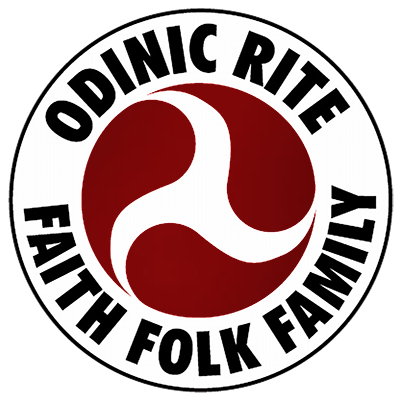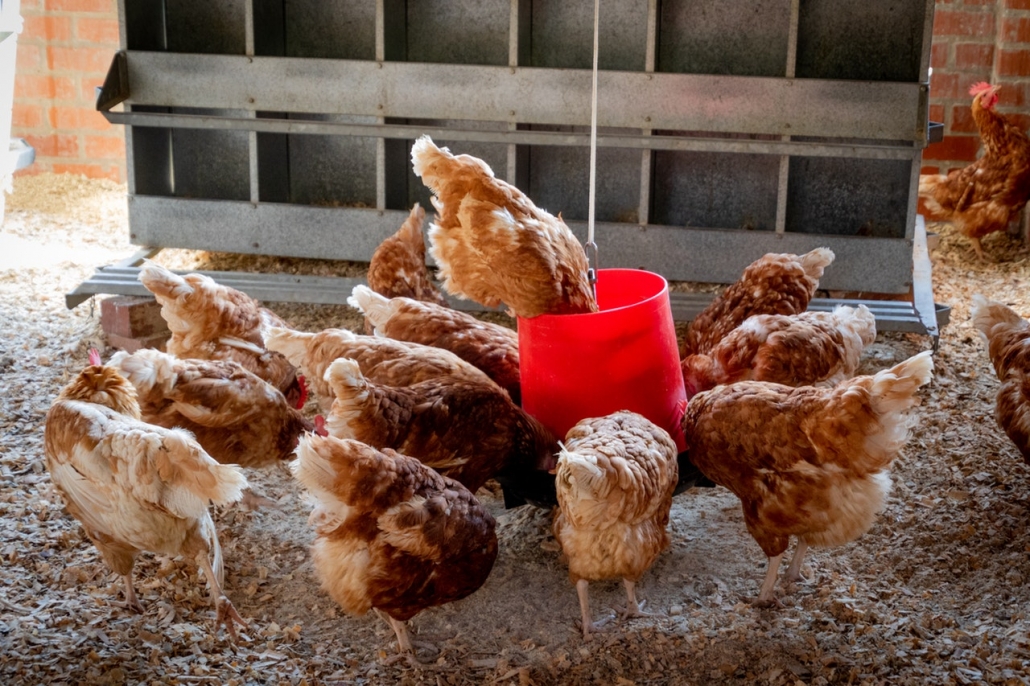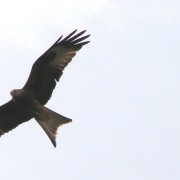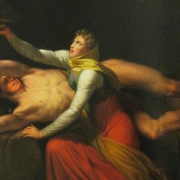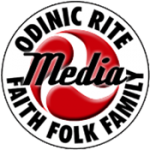Little Red Hens
by Hengest Thorsson OR
A talk from the 2259 Great Moot
All of you, as OR members should be aware that our myths are multi-layered and full of symbolism. They can be accessed on many levels and depending on our level of development will reveal varying degrees of guidance and wisdom to us. Most of you will also be aware that a great many fairy tales and children’s stories contain great wisdom, symbolism etc. They tell us the stories of the seasons and the eternal cycles of nature, of male and female archetypes, of the timeless conflict between light and dark, chaos and order and of folk memory, traditions and the depths of the human psyche. Such are the bed time stories that we, as children learned, and which we in turn pass on.
Of course, as children we had no idea of the depths these stories held, many of them require some study and thought before their hidden meanings even begin become clear and debates rage in academia to this day about the hidden meanings and depths of folk tales. Others are very simple and their meaning immediately obvious, particularly those parables which teach us a moral lesson or guide to life. However, even these outwardly simple tales can contain more below the surface when one goes looking.
The study of folk tales and fairy tales really took off in the 19th century when nationalistic awakenings across Europe led scholars to examine folk tales in search of expressions of the folk soul or psyche. Psychology too played a major role in the rise in popularity of the study of folk tales. Psychologists began to work on the notion that the study of folk tales could reveal the ‘psychology’ of what they considered “primitive” ethnic cultures. This was dubbed ethnopsychology, one of the proponents of which maintained that “the fairy tale is the oldest of all narrative forms and reveals fundamental aspects of the primitive mind”.
Now, as interesting as this subject is, and it is a subject I intend to explore in detail for future articles, my intention today is simply to take a folk tale and use it to illustrate a subject I had already planned to discuss.
The subject is one that I have discussed many times and one that I feel, as a professed member of the OR, that I need to return to and will probably continue to return to. It is a subject which may cause some to feel uncomfortable, for which I make no apology. If my talk makes any of you look inward and think “that could be me” then good, use it as an opportunity to look inwards and ask yourself some questions.
The folk tale I am going to use today was written down in the 19th century, but is thought to be very much older. It is a parable, outwardly very simple to understand, but the moral can be applied to the Odinic Rite and it offers an excellent analogy.
Many of you may know the story of the little red hen, some may have forgotten the story, others still may have never heard the story, so before I continue, let us remind ourselves about the little red hen….
One summer day the Little Red Hen found a grain of wheat.
“A grain of wheat!” said the Little Red Hen to herself. “I will plant it.”She asked the duck: “Will you help me plant this grain of wheat?”
“Not I,” said the duck.
She asked the dog: “Will you help me plant this grain of wheat?”
“Not I,” said the dog.
She asked the cat: “Will you help me plant this grain of wheat?”
“Not I,” said the cat.
She asked the pig: “Will you help me plant this grain of wheat?”
“Not I,” said the pig.
“Then I will plant it myself,” said the Little Red Hen. And she did.Soon the wheat grew tall, and the Little Red Hen knew it was time to reap it.
“Who will help me reap the wheat?” she asked.
“Not I,” said the duck. “Not I,” said the dog. “Not I,” said the cat. “Not I,” said the pig.
“Then I will reap it myself,” said the Little Red Hen. And she did.
So she reaped the wheat, and it was ready to take to the mill to be made into flour.
“Who will help me carry the wheat to the mill?” she asked.
“Not I,” said the duck. “Not I,” said the dog. “Not I,” said the cat. “Not I,” said the pig.
“Then I will carry it myself,” said the Little Red Hen. And she did.So she carried the wheat to the mill and the miller made it into flour, and she carried the flour home.
When she got there, she asked, “Who will help me make the flour into dough?”
“Not I,” said the duck.
“Not I,” said the dog.
“Not I,” said the cat.
“Not I,” said the pig.
“Then I will make the dough myself,” said the Little Red Hen. And she did.So she put on a white apron, and she mixed the dough. Soon the bread was ready to go into the oven.
“Who will help me bake the bread?” Said the Little Red Hen.
“Not I,” said the duck.
“Not I,” said the dog.
“Not I,” said the cat.
“Not I,” said the pig.
“Then I will bake it myself,” said the Little Red Hen. And she did.After the loaf had been taken from the oven it was set on the table to cool.
“And now,” said the Little Red Hen, “who will help me to eat the bread?”
“I will!” said the duck.
“I will!” said the dog.
“I will!” said the cat.
“I will!” said the pig.
“No, I will eat it myself!” said the Little Red Hen.
And she did.
I hope you enjoyed that and I am sure that the moral of the story is not lost on you.
We have a hen, a conscientious, hard working hen, who seeks the assistance of her friends, comrades, whatever you wish to call them, in making something for the benefit of them all. They decline her requests for help, but still she pushes on and achieves her goal. In the end once the work is done the others want to partake of the result. Now it is a simple tale and I am sure that you all know where this talk is leading. Let us have a little look at the story.
It is no mistake that the main character in the story is one of the lowliest creatures on the farm, in terms of size, strength etc. It is expected that a cart horse or a plough horse will work hard as that is their job and they do it as a matter of course without complaint. If there were a hierarchy they would surely be at the top. The hen would no doubt be at the bottom. Surely nobody would expect too much of a humble hen?
The story shows that even the smallest can make a difference and reap the benefits of hard work. It shows her succeeding, in spite of the lack of help from those around her. It would have taken a lot less effort for those larger animals to achieve what she did. She applied the virtues of self reliance, industriousness, perseverance, discipline. She was a little lacking in the hospitality department at the end, but who can blame her?
In later versions of the story there are examples where the hen does all of the work, and still is happy to share the results of that labour with her “community”. Initially my view of the later versions of this story was that it had succumbed to political correctness and that next we would see the hen doing all of the work and sharing her bread with various disabled, lesbian, asylum seeking, pedophile, Muslim farmyard creatures, just to ensure balance and fairness! But when I stopped to think about it I realized that whatever the intentions of those who changed the ending, it was actually not too far from the truth in many cases.
In all groups or organizations there will be bread makers such as the little red hen. But there will be many more bread eaters, those who want to share in the results of others labour but put little or nothing in themselves. If all of the bread makers refused to share the results of their efforts where would we be and how would we ever advance? It would not be a problem if the bread makers outnumbered the bread eaters, but that is rarely the case. So no, it is not so unusual that in later versions the hen would happily share her bread with others for the benefit of all.
Now let us look at the last part of that story again, but this time we will put it into the context of the Odinic Rite.
After the loaf had been taken from the oven it was set on the table to cool.
“And now,” said the Little Red Hen, “who will help me to eat the bread?”
“I will!” said the duck.
“I will!” said the dog.
“I will!” said the cat.
“I will!” said the pig.
“Yes of course!” said the Little Red Hen. “I baked this bread for the benefit of our folk community and am more than happy to share it with my brothers and sisters.
And she did. Although she hoped that next time they would contribute too!
That is more the OR way isn’t it? Working for the benefit of our comrades. But what about next time? What if the others don’t contribute? How many times is the little red hen going to say “Yes, of course you can share my bread despite the fact that you didn’t lift a paw, trotter or webbed foot to help”? Can she go on doing it indefinitely without burning out, and what kind of creatures are those who would let that happen? Surely even the most loyal of creature has limits on what they are prepared to contribute for the benefit of others whilst those others contribute little in return.
We are fortunate that the OR has many bread makers, who happily work for the benefit of their comrades and their faith, seeking little in return other than the results of their work and the knowledge they are advancing a cause they believe in. There are probably more little red hens in the OR now than at any time in our recent history. They will keep sowing seeds and working towards that next loaf that they can share with their comrades.
But unfortunately, as with all groups, we also have our fair share of bread eaters. I doubt many people join the OR with the intention of taking and not giving, so how is it that many end up doing just that? Well, there are various possibilities.
1.Perhaps they think that we are like other groups who just want to take your money and send you a publication every few months in return. We would hope that this idea would soon be proved false as it is evident to anyone who joins that we are about action and advancement. Surely such people would soon start to feel uncomfortable about their lack of action while so many around them are busy doing things for the OR?
2.Perhaps they don’t think they have anything to offer. I think the little red hen story demonstrated that all can make a difference. Some of you may remember Heimgest’s analogy of the OR being like a tree where the individual OR members were likened to the leaves. Individually, a leaf contributes just a tiny bit to the vitality of a tree but in conjunction with all of the other leaves, that little contribution is part of an essential process which ensures the trees growth.
One of the simplest examples of where people should be contributing is ORB. Not everyone has an article in them, but ORB is not all about 4 page articles. It is about poems, reports, pictures etc. It could be artwork, a recipe, a boast, a book review, a music review, a response to an article, even just a note to say how much you enjoyed it or why you disagree with it.
That is just a simple example of where we should ALL have something to offer. Anyone can arrange a Guardians event, anyone with kids can arrange an AH event, even if it is just a family based one.` The list of what people who feel they have nothing to offer can do is endless.
3. Perhaps there are those who have lots to offer but are unsure of how to go about it, or feel that their ideas may not be accepted. Well they will never know until they try. It may take some courage, but hey, that is a noble virtue and something we should aspire to. Not every idea will be accepted. Sometimes ideas are good but the person putting them forward has no track record of reliability and needs to demonstrate that they are the person to take on bigger things. Don’t take offence and just give up. The CG and all officers in the OR make decisions based on the benefit to the OR so the rejection of ideas or suggestions should never be taken personally. Just look at the ideas which have been taken on board in recent years….AH, Fyrd, Guardians, Baby Welcome, Book Drive, OR Media and many other smaller localized things.
Talk to your hearth guardian, if you have no hearth then what are you doing to rectify that? Many hearths start out widely dispersed geographically and only meet a few times a year, but that is the starting point from which new local hearths will come.
Run your ideas past H, Asrad, Me, Hyndla, run them past other members and offer them up as a group suggestion.
4. The last possibility I am going to offer as to why people do not contribute is that they are lazy or just don’t care so long as they get the benefit of what others are doing. They are the duck, the dog, the cat and the pig. These people have no business being in a vibrant, dynamic and radical movement such as ours. They are dead wood attempting to block the relentless flow of an unstoppable river. They will not stop our advance nor will they slow it a great deal, but they will not aid its advance in any way. They will just continue to leach off others and then, like a bloated tic on a farmyard animal, they will fall by the wayside and wait for the next organism to come along that they can suck the blood of.
So, I have given 4 possibilities although I am sure there are others. But I think these 4 cover most likelihoods. They can be summed up as:
1. Those who think they have joined a quarterly magazine subscription – to those I say look around, who do you think those people in that magazine are who are doing all of those wonderful things for their folk and faith? They joined the same organization as you, made probably the same membership donation and receive the same things for that donation as you do. But these people are different, they saw others working for something they believe in and wanted to be a part of that, to contribute! Are you going to join them or are you happy to leave it all to others?
2. To those who think they have nothing to offer – every member of the OR is an integral part of a living larger organism. Whatever you can offer, although it may seem little to you, combined with the efforts of others it will be multiplied many times. Having nothing to offer is not an option, it is a cop-out. Have some faith in yourself and step up; we all have something to offer.
3. To those who feel they have a lot to offer don’t sit back and wait to be asked. Put yourself forward, speak to relevant people and get that enthusiasm and those skills working for the benefit of faith folk and family. The OR was built and exists because of people who put enthusiasm and ideas into practice and it is that which will carry us forward.
4. And finally to those who think they just don’t need to do anything because others are doing it for them. You are not Odinists, you are not my comrades. You are parasites who know nothing of the 9 noble virtues. You would be the first to complain if the OR did nothing, if you did not receive your ORB. You have no place amongst the noble, hard-working, loyal folk of the OR.
Step aside; there are real Odinists here with bread to make for the advancement of our Faith Folk & Families!
SW SW SW
[/av_textblock]
